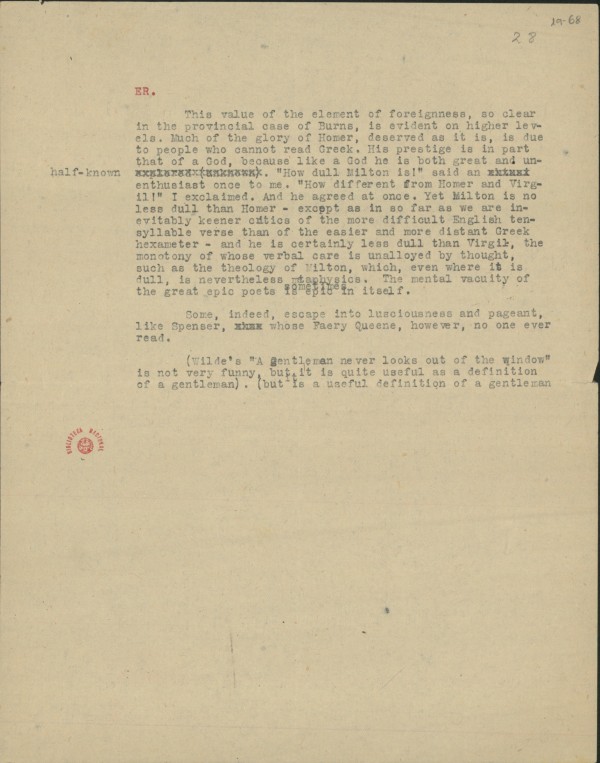Identificação
[19 – 68]
Erostratus.
This value of the element of foreignness, so clear in the provincial case of Burns, is evident on higher levels. Much of the glory of Homer, deserved as it is, is due to people who cannot read Greek. His prestige is in part that of a God, because like a God he is both great and half-known. “How dull Milton is!” said an enthusiast once to me. “How different from Homer and Virgil!” I exclaimed. And he agreed at once. Yet Milton is no less dull than Homer – except as in so far as we are inevitably keener critics of the more difficult English ten-syllable verse than of the easier and more distant Greek hexameter – and he is certainly less dull than Virgil, the monotony of whose verbal care is unalloyed by thought, such as the theology of Milton, which, even where it is dull, is nevertheless metaphysics. The mental vacuity of the great epic poets is sometimes epic in itself.
Some, indeed, escape into lusciousness and pageant, like Spencer, whose Faerie Queene, however, no one ever read.
(Wilde’s “A gentleman never looks out of the window” is not very funny, but it is quite useful as a definition of a gentleman).[1]
[19 – 68]
Heróstrato.
Este valor do elemento de estranheza, tão claro no caso provincial de Burns, é evidente em níveis superiores. Muito da glória de Homero, por merecida que seja, é devido a pessoas que não conseguem ler grego. O seu prestígio é em parte o de um Deus, porque tal como um Deus ele é simultaneamente grande e meio-conhecido. “Quão aborrecido é Milton!”, disse-me uma vez um entusiasta. “Quão diferente de Homero e de Virgílio!”, exclamei. E logo ele concordou. Contudo, Milton não é menos aborrecido do que Homero – excepto na medida em que somos inevitavelmente críticos mais aguçados do mais difícil verso decassilábico inglês do que do mais fácil e mais distante hexâmetro grego – e é certamente menos aborrecido do que Virgílio, cuja monotonia do cuidado verbal está desligada do pensamento, tal como a teologia de Milton, que, mesmo onde é aborrecida, é ainda assim metafísica. A vacuidade mental dos grandes poetas épicos é por vezes épica em si.
Alguns, com efeito, fogem para a luxo e para o sumptuoso, como Spencer, cuja Faerie Queene, contudo, ninguém leu.
(“A gentleman never looks out of the window” de Wilde não é muito divertido, mas é muito útil para a definição de um cavalheiro).
[1] but it is quite useful as a definition of a gentleman). /(but it is a useful definition of a gentleman)\


